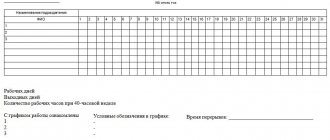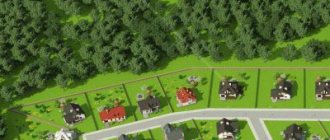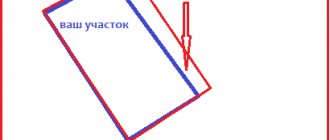SNT House Land
11/15/2020 rent, mortgage, loan, snt

In order for a citizen to be able to use a land plot legally, he is obliged to formally register ownership rights to it. All lands of the Russian Federation are divided into several categories according to their purpose: agricultural, industrial, for construction, etc. In this connection, it is necessary to understand the purpose of the land for individual housing construction, SNT and DNP and what the difference is.
- 1 General concept of individual housing construction, SNT, DNP 1.1 Individual housing construction
- 1.2 DNP lands
- 1.3 SNT Lands
Land categories
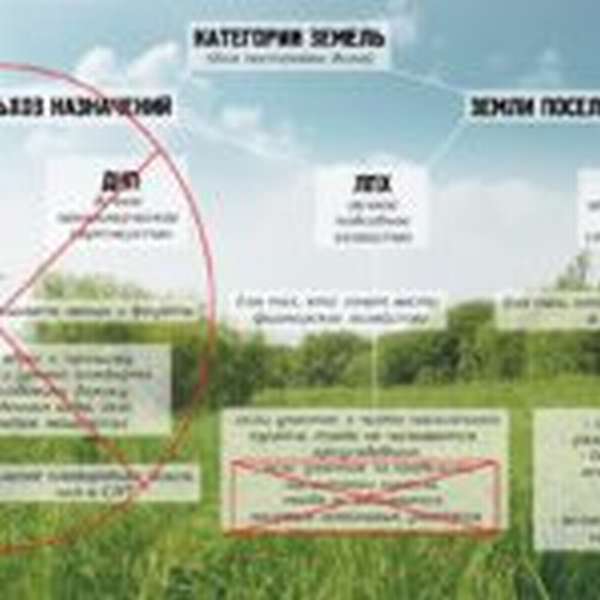
Among the available forms of acquiring real estate, lands and buildings located in the tracts, are:
- non-profit partnership of dacha type - DNT,
- non-profit dacha partnership - DNP,
- non-profit gardening partnership - SNT.
All these types of ownership belong to the form of dacha cooperatives. They have a unifying principle - the use of land.
When buying a dacha, citizens are guided by price, considering it correct to choose solely based on whether the plot is expensive or cheap. When choosing, you need to take into account other factors, among which the category of land plays an important role. Since these are the moments that can cause many difficulties in the future, for example, reduce the possibility of using land or buildings.
For example, when purchasing a plot for gardening, you should pay attention to the possible use of this particular territory for such purposes. If it is intended exclusively for the construction of residential buildings, then it may be difficult to plant a garden there.
That is why, when choosing a plot to purchase for certain purposes, you need to know how they differ from each other. In particular, their legal and factual differences.
Lands according to DNP type

DNP territories include those areas that belong to a legal entity from the owners of land plots in a specific complex. The person, in this case, is the founder or one of the members of the cooperative.
The founder acts as an intermediary between land owners who have joined the cooperative in order to use the land. It is he who coordinates all important and necessary points with the local administration. If citizens have not previously privatized land plots, then they have every right to engage in privatization in relation to the rented plot.
Important! How is it different from SNT? Such plots have a lower price because the land on them is less fertile. Typically, such areas are purchased to build a small building and grow a garden. According to the new law, it is allowed to organize DNP on the lands of settlements.
Pros of DNP:
- low price in comparison with land for individual housing construction and SNT,
- there is no need to conduct a technical examination of the building that was erected in order to recognize its status as residential,
- a citizen, purchasing a plot of land in the DNP, becomes a member of the partnership and receives the right to participate in meetings,
- when a land plot is located on the land of a settlement, the issue of registration will be much easier to resolve than in the case of a gardening non-profit partnership.
Disadvantages of DNP:
- it will not be possible to erect a large building for permanent residence in such an area,
- on such lands there is no provision for gas and other communications to the buildings; if a person wants to do this, he will have to pay a lot of money,
- in the vicinity of the lands of the DNP there are no buildings necessary for the normal residence of citizens, objects,
- sometimes it can be difficult to register for such areas,
- the purchase of territory obliges the construction of a house, and its further registration as property, since it is not intended exclusively for growing plants.
Banks in the Russian Federation are cautious about processing and issuing a mortgage loan in relation to DNP plots. Therefore, it is worth preparing for a long journey when purchasing land with a mortgage.
SNT DNP what is it?
On many sites you can find the expression: land SNT or DNP. What is meant in this case?One might think that in this case we mean land (land plot or plots) owned or leased by a gardening or dacha association of citizens. And indeed, with a literal interpretation of this expression, especially among lawyers, this statement will be true.
However, we are primarily interested in another, more frequently used meaning of this expression, associated primarily with the legal status of the type of use of the site , without reference to its owner or tenant. After all, an ordinary summer resident or gardener, or an average person interested in acquiring land, is far from legal terminology or a similar communication environment.
So, in order to understand the meaning of the expressions “ SNT section ” or “ DNP section ”, you need to know the following:
- all lands are divided into their categories (for example: lands of settlements, industrial lands, forest lands or lands for agricultural activities, etc.) and each land plot is assigned to one of these categories
— for each category, the types of permitted use of land plots belonging to this category are legally assigned (for example: arable land, conducting industrial activities, construction of residential buildings, etc.), in other words, it is established what can be done on each specific land plot (as use the site)
— each land plot, in addition to its category, also has its own type of permitted use, which does not contradict its category
Therefore, most often, when they say or write: “ SNT/DNP lands ,” they mean the permitted type of land use. It is worth noting separately that the category of land plot with the permitted type of use SNT or DNP will always be “ agricultural land ”. That is why, in colloquial speech, a phrase is often used that is tautological in its meaning: agricultural land SNT/DNP. Only professional lawyers know what this “butter” is.
Thus, the correct decoding of “ SNT/DNP lands ” or “ SNT/DNP agricultural lands ”, in relation to the type of land plot, should be as follows:
SNT lands - agricultural land intended for gardening
DNP lands - an agricultural land plot intended for dacha farming
The types of permitted use of SNT/DNP on agricultural land are practically the only ones on which garden/country house or residential houses is permitted (the exception is such type of use as private subsidiary plots - personal subsidiary plots).
up
SNT lands

The lands on the territory of SNT differ from others in their high fertility and are allocated only for summer cottages. The quality of the soil is strikingly different from categories such as DNT and DNP. They are located outside the territory of populated areas and have the status of agricultural land.
The right to own a plot of land for the citizen who bought it is determined by membership in a non-profit partnership. The subject of ownership is the founder, but it is also possible to allocate him to ownership through certain procedures. Among them:
- setting boundaries
- registration of written approval from the administration or the main member of SNT,
- registration of ownership,
- ransom work,
- privatization procedure.
The basis of such a structure is its corporate spirit. Actions that are carried out only with the common efforts of the members of the partnership:
- conducting electricity,
- drilling of the wells,
- road expansion, etc.
Such categories of sites have a more respectable status compared to DNP sites. In the DNP, land areas are classified as a budget option for property, since the quality of the land there is worse.
The advantages of SNT include:
- located in the countryside,
- very good land for agricultural development,
- on a plot of this type you don’t have to build a country house, you can just engage in agriculture,
- is cheaper than land for individual housing construction.
Among the disadvantages are:
- bringing communications to the sites requires certain efforts,
- It is difficult to register at the site; you will have to collect a package of documentation and contact many authorities.
What is the main difference between DNP and SNT? The fact is that on the lands of the gardening non-profit partnership, the soil is very good for growing crops.
General concept of individual housing construction, SNT, DNP
To understand how different categories of land differ, you must first understand how SNT and DNP, individual housing construction are deciphered.
SNT is a gardening non-profit partnership whose lands are located in agricultural areas.
Individual housing construction is land that is intended for individual construction and is located in the territories of populated areas.
DNP is a dacha non-profit partnership.
individual housing construction
Individual housing construction objects are only lands adjacent to populated areas. Each plot from this category is provided exclusively for its intended use. It is allowed to build separate residential buildings on them, designed for one family. In this case, the building cannot have more than 3 floors.
This is the most optimal option for individual development. Authorized organizations easily issue permits for construction work on individual housing construction sites.
Advantages:
- Availability of address. Residential private houses built on individual housing construction lands are assigned their own number and street name.
- Owners of their own houses located on individual housing construction lands have the opportunity to use social facilities: kindergartens, educational institutions, medical clinics, cultural centers, and other social facilities.
- Availability of infrastructure in the area where the residential property is located: access routes to the site, adjacent roads, public transport stops, etc.
- The presence of centralized communication systems, which, if installed independently, can account for up to 30% of the total costs of individual construction.
- High liquidity of real estate. Individual housing construction plots are more in demand on the land market than SNT and DNP plots.
Flaws:
- Due to the large number of significant advantages, incl. With increased liquidity, individual housing construction plots are much more expensive than lands of other categories.
- The construction of a residential building on such a site requires mandatory approval of the construction project and obtaining permission from local authorities to carry out construction work.
- The property must meet established building standards. In some regions of Russia this is quite difficult to achieve. For example, the territories adjacent to Sochi are protected areas. Accordingly, it is more difficult to obtain permission for individual construction and register a finished residential property. The most stringent requirements are imposed on communication systems. For example, the construction of a sewer system must be carried out strictly using environmentally friendly technology.
- Land plots of individual housing construction have their own restrictions on the minimum and maximum size, which are established by regional legislation. For example, in order to officially register a private house in Tatarstan, it must be located on a plot of land with an area of at least 4 acres.
- Taxes on individual housing construction land are quite high. The percentage tax rate is 1.5% of the cadastral price of the plot itself. The state tax is significantly higher than the tax rate provided for the objects of gardening and dacha organizations.
DNP lands
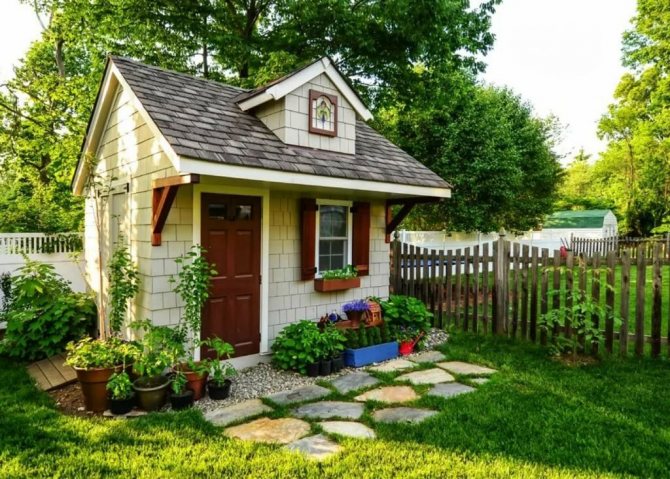
Dacha partnership is an association of owners of dacha land plots. Upon receipt of partnership plots, future owners undertake to erect some kind of building on them.
Advantages:
- For plots owned by DNP, the state provides a significantly lower tax. The cadastral price of some DNP objects is almost 2 times less than the cost of individual housing construction land. At the same time, areas of different categories may be geographically located close to each other.
- When building a house, you do not need to create a preliminary design. However, no inspections are provided by the competent authorities.
- Land owners have the right to vote at public meetings of the organization. They can put forward their own proposals, and their voice can influence fairly important decisions of the organization.
- Low state real estate tax.
Flaws:
- According to their intended purpose, DNP facilities are not intended for year-round use. Accordingly, they are not connected to public communication systems. Therefore, it is quite difficult and expensive to supply gas and electricity to the site yourself.
- Difficulty of registration. Official registration in a house built on DNP land is possible only through a judicial procedure. As a rule, the judicial procedure requires a certain amount of time and additional financial costs.
- Partnership members make annual user fees for watering their gardens, summer electricity and other needs.
- It is almost impossible to purchase DNP land through a mortgage lending program. Also, financial and credit organizations do not accept such real estate as collateral for loans.
Please note: Any residential property built on a dacha plot of land does not require approval from local authorities and technical expertise.
SNT lands
Land plots owned by gardening partnerships belong exclusively to the category “agricultural land”.
Advantages:
- Most of these lands are located in picturesque places, incl. near lakes and rivers.
- To erect a residential building on a site, you do not need to first create a construction project and coordinate it with the relevant authorities.
- Low cost of the object.
- Minimum tax rate.
Flaws:
- It is quite difficult to register in a finished residential building.
- Mortgage programs are not provided for the purchase of SNT plots.
When planning to buy a plot of land, many are interested in how SNT differs from DNP if both categories of land are located in agricultural areas. The difference between DNP and SNT is only in the pricing policy: cadastral value and tax rate.
Advantages and disadvantages of such lands in relation to other categories

In addition to DNP and SNT, there are other categories of land, how do they differ? Advantages of DNT and DNP lands over the categories of individual housing construction lands:
- lower price for territory,
- simplified object acquisition system.
Among the disadvantages is that it will be more difficult to obtain permission to register. On the territory of the DNP and DNT plots, in contrast to private household plots, it is allowed to erect capital-type buildings on them. But these areas are not suitable for raising livestock and poultry.
Compared to SNT, DNP and DNT plots can be classified as budget options for real estate, with similar use of the plots. But, at the same time, despite its price, SNT lands have better quality soil.
Is it possible to build a house on the territory of SNT? Yes, such areas can be used to build a house. In order to register a building, you will have to perform some administrative and legal actions that are not necessary when registering buildings in other territories.
Moreover, the price of a SNT plot is almost identical to the price of a plot for individual housing construction, but these lands are always allocated outside settlements and towns. The construction of a house on the territory of a garden partnership is not supported by the standards that must be observed when constructing on the territory for individual housing construction.
